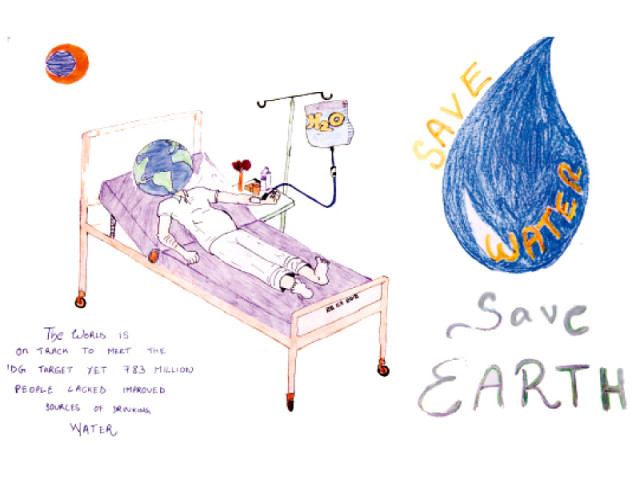World Water Day marked across twin cities with caution, hope
Speakers underscore the need to conserve and recycle water to fight health hazards and scarcity.

Often taken for granted, water resources require due attention before the country is depleted of the universal solvent. A number of events across the twin cities offered some insight into the issue on the occasion of World Water Day on Thursday.
Water: the wellspring, the root of disaster
While water is the wellspring on earth, it can also be the root of disaster and devastation, said Madiha Khalid, a speaker at a seminar at the National Library. She noted that floods and droughts affect a greater number of people compared to other disasters. About 1.5 million children each year die due to inadequate access to water supply, sanitation and hygiene, she said.
Speakers traced the link between safe water and malnutrition. While water is directly important to fighting undernourishment, it indirectly safeguards food security as erratic rainfall, droughts, floods and seasonal differences in water availability can cause temporary food shortages and even intensive food emergencies.
Pakistan being a largely dry country is steadily heading towards water scarcity as our population grows. Pakistan Institute for Environment Development Action Research says that Pakistan has reached near the limit of renewable water resources, with agriculture consuming more than 90%, leaving little for other users, such as homes and industry, and for nature, such as wetlands.
However all is not lost: Madiha said that by better control and application of irrigation and rain water, and with good agricultural practices, we can use little water to do more.
Wasa marks World Water Day
To meet the demand of drinking water in Rawalpindi, the Water and Sanitation Agency (Wasa) has been working on three different projects: supply from Indus River, construction of a local dam and digging up more tube-wells. This was stated by Wasa Deputy Managing Director Akram Akram Soaban at a seminar in Rawalpindi on Thursday.
He said in the first project they had been working with the Capital Development Authority to bring water from Indus River. If the project is materialised, Rawalpindi will get 400 million gallons of water every day in the next summer.
Secondly, the Wasa official said the process of acquiring land for Chirah Dam was underway. After the completion of the dam the city residents will get 15 million gallons of water every day.
The third project was about digging up 12 more tube wells in Sohan village, in addition to the seven already working. Soaban said if the three projects are completed, the water needs for Rawalpindi would be fulfilled for the next 50 years.
Civic bodies criticised for not doing enough
Meanwhile, speakers at a conference criticised the civic bodies for not addressing the acute water shortage, especially in the summers. Despite tall claims made by successive governments, no new dams have been constructed, said a press release issued by HELP FORUM.
Moreover, water contaminated by sewage is posing threat to the health of the residents of Rawalpindi, as the water being supplied from Rawal Dam has become heavily polluted by sewage, said Global Peace Foundation Chairman Haji Mohammad Gulzar Awan. He stressed the need to change the waterlines and install up-to-date water treatment plant before the main distribution channel.
The conference was arranged by the Global Peace Foundation in collaboration with the Human Rights, Environment and Landscape Protection Forum.
Published in The Express Tribune, March 23rd, 2012.



















COMMENTS
Comments are moderated and generally will be posted if they are on-topic and not abusive.
For more information, please see our Comments FAQ